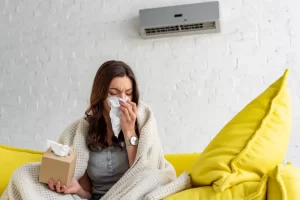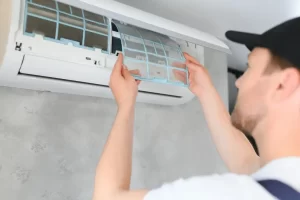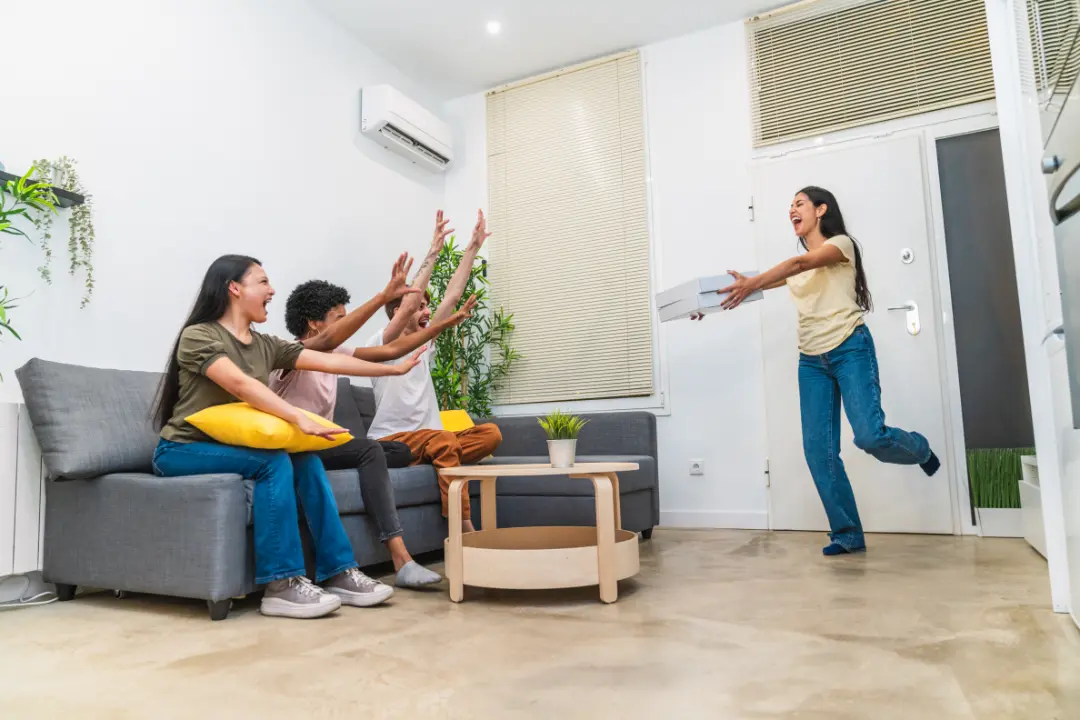Air conditioner allergy symptoms can be frustrating and challenging to deal with. However, there are some strategies you can use to avoid these symptoms and keep the air in your home free of allergens. In this comprehensive guide, we will provide actionable tips, such as selecting the right filters and understanding maintenance cycles, to help you prevent allergy symptoms and maintain a comfortable living environment. Following the advice in this guide will help you keep your air clean and free from allergens.
Key Takeaways
- Air conditioner allergies are caused by allergens, not the air conditioning itself.
- These allergens include pollen, dust mites, mould, and pet dangers. High-quality air filters with appropriate MERV ratings and regular replacement according to manufacturer guidelines are critical for trapping allergens and maintaining indoor air quality.
- Professional maintenance and specialised cleaning services, such as those we offer at SmartWay Air Conditioning, are essential in combating allergen buildup and ensuring the AC system circulates clean air.
Understanding Air Conditioner Allergies: Causes and Symptoms
Air conditioner allergies, sometimes referred to as air conditioning sickness, are not reactions to the air conditioning system itself but rather to the allergens circulated by the AC unit. In other words, people are not allergic to air conditioning but rather to common culprits such as pollen, dust mites, mould, and pet dander.
These particles can trigger allergic reactions, causing symptoms such as sneezing, a runny nose, and itchy eyes. Furthermore, if the system is not adequately maintained and cleaned, air conditioners may exacerbate allergy symptoms by distributing contaminants like bacteria and viruses, which can cause illnesses such as hypersensitivity pneumonitis, allergic rhinitis, or asthma.
One key factor that leads to allergens circulating by the air conditioning unit is the state of the air filters. If the filters are dirty or clogged, they won’t be able to effectively trap these allergens, leading to their distribution throughout your living space. Therefore, comprehending the role of air filters in allergen control is essential.

The Importance of High-Quality Air Filters
The significance of using high-quality air filters cannot be understated. These filters are the first line of defence against indoor allergens. They work by trapping these allergens and preventing them from circulating in your home. The type of air filter you choose and how often you replace it can significantly impact your indoor air quality. In this discussion, we will explore choosing an appropriate filter and establishing a consistent replacement routine.
Choose the Right Filter
When choosing an air filter, it’s essential to consider the Minimum Efficiency Reporting Value (MERV) rating. This rating tells you how well the filter can capture particles of different sizes, including common allergens. Filters with a high MERV rating, such as High-Efficiency Particulate Air (HEPA) filters, are particularly effective at trapping even fine particles, making them an excellent choice for people with allergies.
However, there is no one-size-fits-all approach to selecting a filter. Factors such as personal sensitivity to specific allergens, your environment, and pre-existing conditions like asthma should guide your decision. To help you choose the right filter, here are some key points to consider:
- If you have pets, choose filters that are designed to trap pet dander effectively.
- If you live in a high-dust environment, select a filter that can capture much dust without getting clogged too quickly.
- If you have asthma, choosing a filter with a higher MERV rating is crucial to protect against allergens that can worsen your symptoms.
Regular Replacement Routine
It’s essential to keep air filters clean to ensure that they work effectively. Dirty or clogged filters won’t be able to trap allergens, which can exacerbate allergy symptoms by circulating them back into your living space. To maintain optimal indoor air quality, it’s important to regularly inspect your air filters and follow the manufacturer’s replacement guidelines.
Several factors can determine how frequently you should replace your filters, such as the type of filter, the air quality in your area, and whether it’s allergy season. During peak allergy seasons, filters should be replaced at least once a month and every 3-4 months during other periods. Regularly replacing your filters, particularly HEPA filters, can help capture small particles and allergens.
Professional Maintenance: Your Ally Against Allergies
Consistent air conditioning system maintenance is crucial to control and reduce indoor allergens. A well-maintained system can efficiently filter out pollutants and allergens, whereas neglected systems might recirculate these allergens back into the living space with cold air.
At Smartway Air Conditioning, we provide comprehensive air conditioner maintenance, repair, and cleaning services to help combat allergies.

Seasonal Tune-Ups
As the seasons change, different allergens can trigger allergies. That’s why it’s a good idea to schedule a professional inspection and maintenance of your AC system in the spring, before peak usage seasons. This is known as a seasonal tune-up. During a tune-up, professionals will clean and maintain your AC system, including air conditioning units, to ensure they function efficiently and improve indoor air quality. They will inspect each AC component thoroughly, check for leaks or blockages, clean or replace air filters, and clean the coils and drain pan. By ensuring your system is in top shape before heavy usage seasons, you can reduce the likelihood of allergens circulating in your home.
Specialized Cleaning Services
In addition to routine upkeep, specialized cleaning services like air duct cleaning and mould removal are crucial in battling allergen accumulation. Mold and mildew growth are common problems in AC systems that contribute to allergy symptoms. Therefore, professional duct cleaning every three to five years can help eliminate allergen buildup and reduce allergy symptoms.
How to Create an Allergy-Friendly Environment
While it is important to have your HVAC system professionally maintained to combat allergies, you can also take some steps at home to create a more allergy-friendly environment.
Aside from controlling humidity and scheduling regular HVAC maintenance, you can implement certain cleaning practices to minimise allergens in your home. For instance, vacuuming with a HEPA filter cleaner can significantly reduce the dust and allergens in your living space. Additionally, washing your bed sheets in hot water can help eliminate dust mites and other allergens.
Minimising clutter at home can also help make cleaning easier and more effective. To help you reduce allergen buildup and control animal dander, replace heavy drapes and carpets with washable curtains and low-pile or bare flooring. Also, clean your pets’ favourite furniture and toys frequently. After cleaning, leave the house for several hours to allow airborne allergens to settle. This makes it easier for allergy sufferers to return to a less allergen-rich environment.

The Role of Humidity Control
The level of humidity in your home can significantly impact allergens like dust mites and mould. High humidity can promote their growth, while low humidity can cause irritation in nasal passages. Therefore, maintaining indoor humidity levels below 50% can minimise the growth of these allergens.
You can control indoor humidity in several ways. For instance, using air conditioners in warm weather can help reduce indoor humidity levels. Dehumidifiers can also be effective, especially in damp areas of your home, like basements. Humidity control is vital in diminishing air conditioner allergy symptoms and fostering an allergy-friendly environment.
Why Choose Smartway Air Conditioning in Sydney?
When it comes to air conditioning services in Sydney, SmartWay Air Conditioning is an exceptional choice. We are experts in our field with over 30 years of experience in air conditioning installation, repair, and maintenance for residential and commercial properties. Our commitment to providing high-quality service is available round-the-clock, with an intense focus on customer satisfaction by offering a comprehensive range of air conditioning services.
At SmartWay Air Conditioning, we offer a 100% satisfaction guarantee and competitive pricing, ensuring that our customers receive the best value for their money. We also provide free estimates, ensuring financial transparency. With our solid track record and positive customer feedback, you can rest assured that you’re in good hands with SmartWay Air Conditioning. Contact us today for an estimate!
Frequently Asked Questions
What causes air conditioner allergies?
Air conditioner allergies are caused by allergens like pollen, dust mites, mould, and pet dander circulated by the AC unit, not the AC itself. To minimise your symptoms, be sure to address these allergens.
How do high-quality air filters help with allergies?
High-quality air filters, especially those with a high MERV rating, effectively trap allergens and prevent them from circulating in your home. This can help reduce allergy symptoms.
How often should I replace my air filters?
To maintain good air quality in your home, you should replace your air filters at least once a month during peak allergy seasons and every 3-4 months during other periods.
What role does humidity control play in managing allergies?
Controlling indoor humidity levels can minimise the growth of allergens like dust mites and mould, improving air quality and reducing allergy symptoms. Maintaining proper humidity levels is essential in managing allergies.
Final Thoughts
Managing allergies caused by air conditioning involves understanding the root cause, using high-quality air filters, performing regular maintenance, and taking steps to create an allergy-friendly environment. By implementing these strategies and seeking professional assistance from SmartWay Air Conditioning, you can effectively alleviate allergy symptoms and enjoy a healthier, more comfortable living space. Remember, while air conditioning allergies can be problematic, they can be managed. So, take the first step towards a healthier home today.
If you want to breathe easier and enjoy the comfort of your air conditioning without worrying about allergies, consider scheduling an appointment with SmartWay Air Conditioning today. Our team of experts will provide meticulous AC maintenance, cleaning, and filter replacement, all while ensuring your satisfaction.


